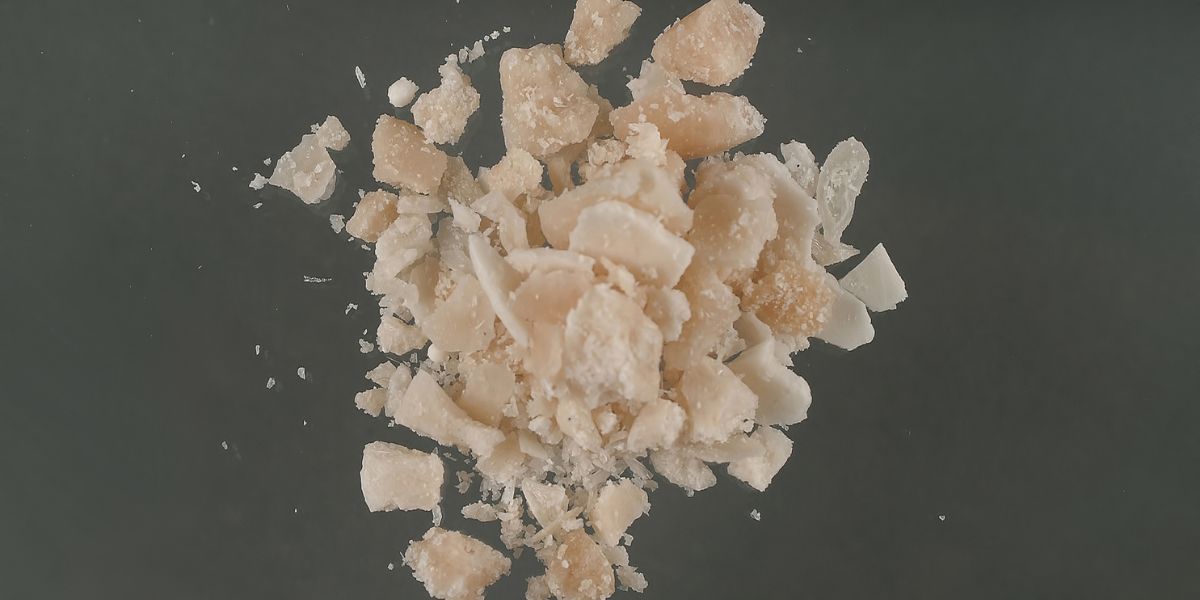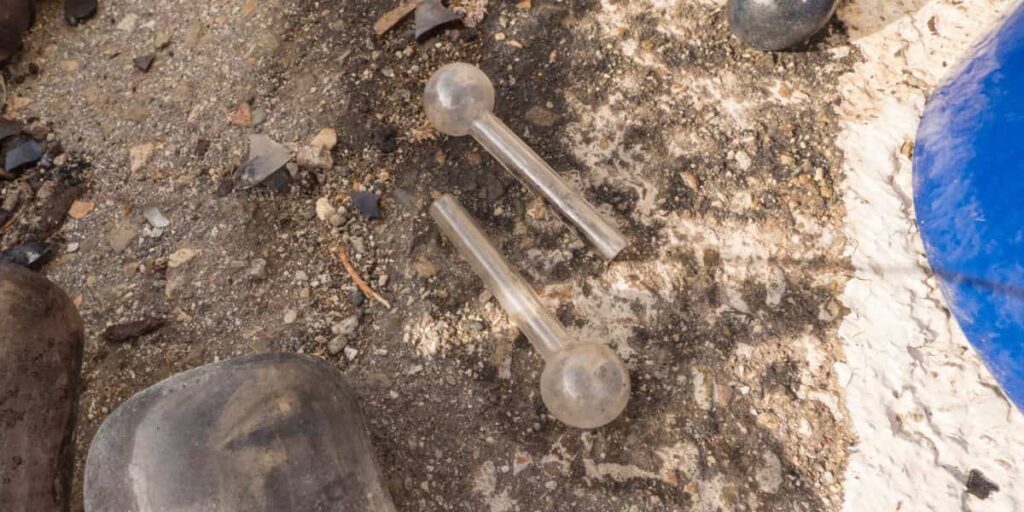Signs of Crack Cocaine Addiction

Crack cocaine is a powerful and highly addictive stimulant that has severe short and long-term effects on the brain and body. People typically smoke crack cocaine, unlike powder cocaine, which leads to a rapid onset of intense euphoria and other effects. Crack cocaine is highly addictive. It’s important to know the signs of addiction for early help and support.
What Does Crack Look Like?
Crack cocaine is distinct in appearance compared to other forms of cocaine. It comes in small, irregularly shaped crystals or “rocks” that can vary in color from white to yellowish.
The production process involves mixing powder cocaine with baking soda and water, then heating the mixture until it forms a solid. This method removes impurities and creates a more potent substance that can be smoked.
The street names for crack include “rock,” “base,” and “hard,” referring to its solid form. The drug’s appearance and the sound it makes when heated—often described as a crackling sound— are distinctive markers that differentiate it from powder cocaine.
The way crack is packaged and sold also sets it apart from cocaine. It is typically sold in small quantities, often as a single “rock,” making it more accessible and affordable than powder cocaine. This accessibility contributes to its widespread use in various socio-economic groups, making addiction a pervasive issue across diverse communities.

What Are the Effects of Smoking Crack?
The effects of smoking crack are immediate and intense, which contributes to its high addiction potential. When smoked, the drug rapidly reaches the brain, producing a brief but powerful euphoric high. The short-term effects of smoking crack include:
- Euphoria and increased energy: Users often feel a sudden rush of pleasure and alertness.
- Increased heart rate and blood pressure: These physical side effects can be dangerous, especially for people with pre-existing cardiovascular conditions.
- Decreased appetite: This can lead to significant weight loss over time.
- Increased body temperature: Users may experience excessive sweating and dehydration.
- Hyperactivity and restlessness: Crack cocaine stimulates the central nervous system, leading to heightened physical and mental activity.
The euphoric effects of smoking crack are short-lived, often lasting only a few minutes. After the effects wear off, users often feel extremely tired and sad and have strong cravings for the drug. This pattern of feeling good and then feeling bad can make people keep using drugs to feel good and avoid feeling bad when they stop.
Additionally, smoking crack can cause severe damage to the respiratory system. Smoking can cause chronic cough, lung infections, and breathing problems due to the heat and chemicals inhaled. Over time, this damage can lead to more severe health problems, including lung cancer and chronic obstructive pulmonary disease (COPD).
Signs of Crack Cocaine Addiction
Physical signs of crack cocaine addiction are often evident and can include:
- Dilated pupils: A telltale sign of stimulant use, including crack cocaine.
- Weight loss: Often dramatic due to reduced appetite and neglect of nutrition.
- Skin issues: Users may have sores or burns on their lips, face, and fingers from smoking crack.
- Neglected appearance: Addicts may show signs of poor personal hygiene and lack of grooming.
- Frequent nosebleeds: Though less common with crack than powder cocaine, some users who insufflate (snort) the drug may experience nosebleeds.
These visible signs can be particularly alarming for family members and friends, as they often indicate severe and escalating drug use. In addition to these physical signs, users may also exhibit signs of physical neglect, such as wearing dirty or messy clothing, appearing unkempt, or having a generally unhealthy appearance.
Mental and Behavioral Signs
Crack cocaine addiction also manifests in significant changes in a person’s mental state and behavior. Key indicators include:
- Paranoia: Users may experience irrational distrust of others, sometimes leading to isolation.
- Aggression and violent behavior: The drug can heighten irritability and aggression, potentially leading to confrontations or legal issues.
- Mood swings: Rapid mood changes, from euphoria to depression, are common.
- Obsessive focus on obtaining and using the drug: People may neglect responsibilities, relationships, and activities they once enjoyed.
- Increased risk-taking behavior: This may include engaging in illegal activities, risky sexual behavior, or dangerous situations to obtain the drug.
Addiction can harm a person’s mental health just as much as their physical health, making it hard for them to do everyday tasks. The intense cravings for the drug can overshadow all other aspects of life, leading to a cycle of compulsive drug use and destructive behavior. Someone who is addicted may also have mental health problems like anxiety or depression. This can make treatment harder.
Crack Withdrawal Symptoms
Withdrawing from crack cocaine can be challenging because of the drug’s profound impact on brain chemistry. The withdrawal process can include:
- Intense cravings: These are often the most challenging symptoms to manage, driving the potential for relapse.
- Depression and anxiety: Mood disorders are common during withdrawal, exacerbated by the absence of the drug’s stimulating effects.
- Fatigue: The body’s recovery from constant overstimulation can lead to extreme tiredness and lethargy.
- Increased appetite: As the body’s metabolism normalizes, appetite often returns, sometimes leading to overeating.
- Disturbed sleep: Insomnia or hypersomnia can occur as the body’s sleep cycle readjusts.
- Muscle pain and stiffness: Physical discomfort is a common withdrawal symptom as the body readjusts to functioning without the drug.
Crack cocaine symptoms can be different for each person, depending on how serious the addiction is and the person’s health. The psychological aspect of withdrawal can be particularly severe, with many users experiencing profound feelings of sadness, hopelessness, and anxiety. The brain produces less dopamine and serotonin, making emotional and mental healing take longer. This leads to intensified feelings during this time.
Withdrawal from crack cocaine also poses a high risk of relapse. Strong desires and mental discomfort may lead people to use drugs again to ease their symptoms. This cycle of withdrawal and relapse is a common challenge in addiction treatment, highlighting the need for comprehensive and supportive care during the recovery process.

Crack Addiction Treatment at NATC
If you or someone you care about is battling crack cocaine addiction and substance abuse and feeling uncertain or doubtful, you’re not isolated; it’s common to have reservations about seeking addiction treatment.
Our empathetic team of experts at Northridge Addiction Treatment Center (NATC) recognizes that change can feel daunting. We dedicate the time needed to understand your worries and create a tailored treatment plan that suits your specific needs.
Our small, private residential treatment facility offers a secure and peaceful setting where you can build confidence in your recovery journey. We provide scientifically backed treatments and therapies to address the underlying causes of addiction, helping you develop new, healthy coping mechanisms and communication skills for a successful future.
Our caring specialists are ready to assist you in beginning a new chapter rooted in recovery. Contact us today.
Find Meaningful Recovery
Our caring and compassionate specialists are eager to help you comfortably navigate this journey to recovery. Our individualized treatment plan, programs, and therapies may be a perfect match for you or your loved one. Let us assist you in living the happy life you deserve. It starts with a phone call.




